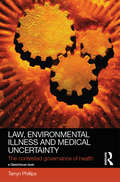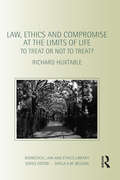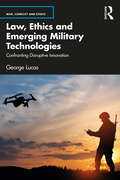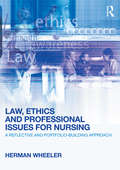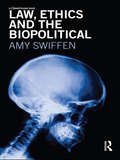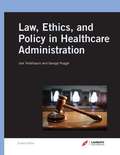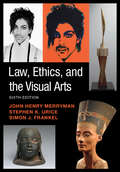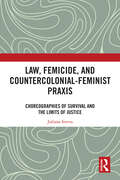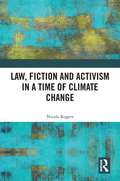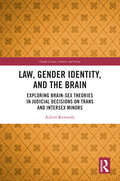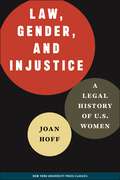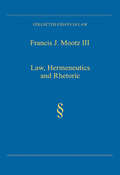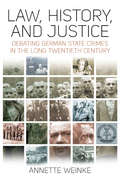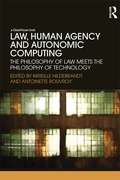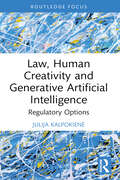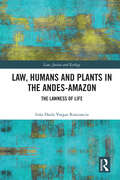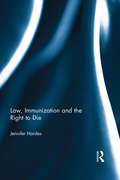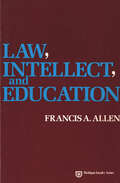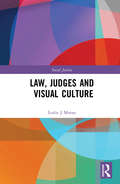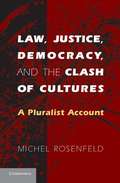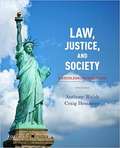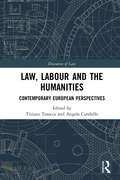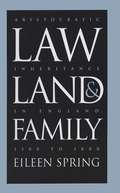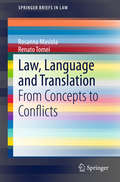- Table View
- List View
Law, Environmental Illness and Medical Uncertainty: The Contested Governance of Health (Social Justice)
by Tarryn PhillipsWe’ve seen it before, with asbestos-related disease, leukaemia clusters and lung cancer caused by cigarettes. There tends to be a lag between the emergence of environmental risks and chemical injuries, and their recognition and therapeutic treatment by medicine and the law. Law, Environmental Illness and Medical Uncertainty examines how our society governs new health concerns as they emerge, and the barriers that face new and uncertain theories seeking recognition in the law. In this book, Tarryn Phillips focuses her investigation on the struggle over the controversial condition multiple chemical sensitivities, or MCS (also known as environmental illness). Presenting nine case studies where workers sought compensation for MCS from their multinational employers, she captures a nuanced portrait of their embittered, unequal battles over the scientific, legal and insurance paradigms for understanding toxic risk, environmental illness and the regulation of industry. It draws on three years of fieldwork in Australia, including interview data with lay people and sympathetic and sceptical experts, participant observation in the courtroom and textual analysis of official reports. The book gives a unique, ethnographic insight into the governance of risk and uncertainty within a neoliberal economy, medico-scientific controversies and courtroom dramas. It highlights how a skeptical approach towards emergent environmental concerns is encouraged within the current regime, and decision-makers face disincentives for taking a sympathetic approach. Compellingly written and easy to read, it should appeal widely to interested lay people, and students and scholars of science and technology studies, medical anthropology, sociology of health and illness, and critical legal studies.
Law, Ethics and Compromise at the Limits of Life: To Treat or not to Treat? (Biomedical Law and Ethics Library)
by Richard HuxtableA conflict arises in the clinic over the care of a critically ill, incapacitated patient. The clinicians and the patient’s family confront a difficult choice: to treat or not to treat? Decisions to withdraw or withhold life-sustaining treatment feature frequently in the courts and in the world's media, with prominent examples including the cases of Charlotte Wyatt, in the UK, and Terri Schiavo, in the USA. According to legislation like the Mental Capacity Act 2005, the central issues are the welfare (or ‘best interests’) of the patient, alongside any wishes they might have conveyed, via an ‘advance directive’ or through the appointment of a ‘lasting power of attorney’. Richard Huxtable argues that the law governing both welfare and wishes frequently fails to furnish clinicians and families with the guidance they require. However, he finds this unsurprising, given the competing ethical issues at stake. Huxtable proposes that there is a case for ‘principled compromise’ here, such that the processes for resolving principled disputes take precedence. He argues for greater ethical engagement, through a reinvigorated system of clinical ethics support, in which committees work alongside the courts to resolve the conflicts that can arise at the limits of life. Providing a comprehensive account of the law pertaining to children and adults alike, and distinctively combining medico-legal and bioethical insights, this book engages scholars and students from both disciplines, as well as informing clinicians about the scope (and limits) of law at the limits of life.
Law, Ethics and Emerging Military Technologies: Confronting Disruptive Innovation (War, Conflict and Ethics)
by George LucasThis book addresses issues of legal and moral governance arising in the development, deployment, and eventual uses of emerging technologies in military operations. Proverbial wisdom has it that law and morality always lag behind technological innovation. Hence, the book aims to identify, enumerate, and constructively address the problems of adequate governance for the development, deployment, and eventual uses of military technologies that have been newly introduced into military operations or which will be available in the near future. Proposals for modifications in governance, the book argues, closely track the anxieties of many critics of these technologies to the extent that they will proliferate, prove destructive in unanticipated ways, and partially or wholly escape regulation under current treaties and regulatory regimes. In addition to such concerns in domestic and especially in international law, the book addresses ethical norms in the professions involved in the design and eventual use of specific technologies, principally involving the professional norms of practice in engineering and the military (as well as biomedical and health care practice), which impose moral obligations on their members to avoid reckless endangerment or criminal negligence in the course of their activities. Thus, in addition to exploring the application of existing legal regimes and moral norms, the book examines how these professions might develop or improve the voluntary constraints on forms of malfeasance that are enshrined in their histories and codes of best practices. This book should prove of great interest to students of ethics, military studies, philosophy of war and peace, law, and international relations.
Law, Ethics and Professional Issues for Nursing: A Reflective and Portfolio-Building Approach
by Herman WheelerThis comprehensive new textbook covers core ethical and legal content for pre-registration nursing students. It provides readers with a sound understanding of the interrelationships between the NMC's code of conduct, standards and competencies, ethics and relevant sections of the English legal system. The only truly integrated text in the field, it opens with overviews of law and nursing, and ethical theories and nursing. It goes on to explore key areas of contention – such as negligence, confidentiality and consent – from legal and ethical perspectives, mapping the discussion onto the NMC code of conduct. The chapters include objectives, patient-focused case scenarios, key points, activities, questions, areas for reflection, further reading and a summary. Case law and statutes and ethical theories are presented where appropriate. Written by an experienced nurse-lecturer with a law and ethics teaching background, Law, Ethics and Professional Issues for Nursing is essential reading for all pre-registration nursing students, as well as students of other healthcare professions.
Law, Ethics and the Biopolitical
by Amy SwiffenLaw, Ethics and the Biopolitical explores the idea that legal authority is no longer related to national sovereignty, but to the ‘moral’ attempt to nurture life. The book argues that whilst the relationship between law and ethics has long been a central concern in legal studies, it is now the relationship between law and life that is becoming crucial. The waning legitimacy of conventional conceptions of sovereignty is signalled the renewal of a version of natural law, evident in discourses of human rights, that de-emphasises the role of a divine law-giver in favour of an Aristotelian conception of the natural purpose of life and the ‘common good’. Synthesising elements of legal scholarship on sovereignty, theories of biopolitics and biopower, as well as recent developments in the domains of ethics, Amy Swiffen examines the invocation of ‘life’ as a foundation for legal authority. The book documents the connection between law, life and contemporary forms of biopolitical power by critically analysing the fundamental principles of the bioethical paradigm. Unique in its critical and cross-disciplinary approach, Law, Ethics and the Biopolitical will be of interest to students and teachers in the areas of law and society, law and literature, critical legal studies, social theory, bioethics, psychoanalysis, and biopolitics.
Law, Ethics, and Policy in Healthcare Administration
by George PozgarThis chapter provides the reader with an overview of ethics, moral principles, virtues, and values. The intent here is not to burden the reader with the philosophical arguments sur¬rounding ethical theories, morals, and principles; however, as with the study of any new sub¬ject, "words are the tools of thought." The reader who thoroughly absorbs and applies the content of the theories and principles of ethics discussed herein will have the tools necessary to empathize with and guide patients through the conflicts they will face when making dif¬ficult care decisions. Therefore, some new vocabulary is a necessary tool, as a building block for the reader to establish a foundation for applying the abstract theories and principles of ethics in order to make practical use of them.
Law, Ethics, and the Visual Arts
by John Henry Merryman Stephen K. Urice Simon J. FrankelSince its first publication in 1979, Law, Ethics, and the Visual Arts has been the foundational text in the field of art law. This thoroughly reorganized and updated sixth edition takes a fresh look at primary materials and commentary from previous editions, extending the book's analysis with significant changes in format and content to reflect changes in the field. The book has multiple uses and audiences: a text for courses in law schools and graduate programs, a reference work for lawyers and museum professionals, and a lively read - filled with engaging legal stories and colorful anecdotes featuring the broad cast of characters in the art world. Complementing their own observations, the authors include excerpts from judicial opinions, scholarly and popular articles, international treaties, and statutory law. Law, Ethics, and the Visual Arts offers a cornucopia of examples, questions, issues, and lessons for students, artists, dealers, collectors, attorneys, and any reader curious about today's complex world of the visual arts.
Law, Femicide, and Countercolonial-Feminist Praxis: Choreographies of Survival
by Juliana StrevaThis book unearths the buried legacies of modern legal thought, exposing femicide’s entanglements with colonialism, Black Atlantic slavery, and their enduring afterlives, while forging countercolonial pathways to justice.In the wake of Marielle Franco’s assassination – a Black feminist city councilor murdered in Rio de Janeiro in 2018 – and amid the global resurgence of far-right authoritarianism, the entanglements of femicide, White supremacy, misogyny, and colonial juridico-political architectures have come into stark focus. Challenging dominant frameworks for understanding gender-based violence, this book draws on the insights of Black, Indigenous, queer, and feminist thinkers, engaging both written and oral traditions. Through transdisciplinary methodology grounded in deep listening to grassroots activists across the territory now known as Brazil, here acknowledged as theory-makers, it exposes femicide as an enduring colonial racial-patriarchal order and lays bare the limitations of liberal legal frameworks. By questioning the colonial foundations of legal order, the book cultivates and seeds terrains to imagine and enact transformative justice and generative forms of redress – engaging with choreographies of survival that gesture toward a politics of vitality.This book will appeal to academics, researchers, activists, and students with interests across a range of disciplines, including critical legal studies; critical Black studies; Indigenous and Amerindian studies; gender and feminist studies; critical criminology; legal anthropology; social movements; Brazilian studies; and anticolonial, decolonial, and postcolonial studies.
Law, Fiction and Activism in a Time of Climate Change
by Nicole RogersThe book examines the narratives of climate change which have developed and which are currently evolving in three areas: law, fiction and activism. Narratives of climate change generated by litigants, judges, writers of fiction and activists are having, and will have, a profound effect on the way we respond to the climate change crisis. Acknowledging the prevalence of unreliable narrators, this book explores the reliability and significance of different forms of climate narrative. The author analyses overlapping themes and points of intersection, considering the recurrent motif of the trickster, the prominence of the child, the significance and ongoing viability of the rights discourse, and the increasingly prevalent emergency framing with its multiple implications for law’s empire. She asks how law, fiction and activism measure up as textual and performative fora for telling the story of climate change and anticipating a climate-changed future. And, in addition, how can they help foster transformative narratives which empower us to confront the climate change crisis? This highly topical, cross-disciplinary work will be of interest to anyone concerned about the growing climate emergency and makes a valuable contribution to climate law, environmental law, the environmental humanities and ecocriticism.
Law, Gender Identity, and the Brain: Exploring Brain-Sex Theories in Judicial Decisions on Trans and Intersex Minors (Gender in Law, Culture, and Society)
by Aileen KennedyThis book challenges law’s reliance on neurology’s brain-sex binary. The brain has become the latest candidate in a historical search for a reliable and fixed biological marker of ‘true sex’ that has permeated every aspect of Western culture, including law. As definitions of the sexed and gendered body have become ever more contentious, the development and dissemination of brain-sex theories have come to dominate popular understanding of LGBTI+ identities. But, this book argues, the brain is no more helpful than earlier biological measures in ensuring just outcomes. Examining how law determines and differentiates ‘male’ and ‘female’ in two contested areas of sexed identity –through a discussion of Australian cases authorising medical interventions to alter the embodied sex characteristics of transgender minors and intersex minors –the book demonstrates an incoherence in the legal understanding of gender identity development. As the brain too fails as a convincing biological anchor for the binary sex categories of male and female, law must, it is argued, retreat from its aspiration to create, define, and regulate artificially bounded sex categories of male and female. This book will be of great interest to scholars and students in a range of disciplines who are working at the intersection of law, gender, and sexuality.
Law, Gender, and Injustice: A Legal History of U.S. Women (Feminist Crosscurrents)
by Joan HoffA groundbreaking analysis of how gendered oppression is written into the American legal systemLaw, Gender, and Injustice: A Legal History of U.S. Woman is a landmark study of how women remain second-class citizens under the current legal system. In this widely acclaimed book, Joan Hoff questions whether the continued pursuit of equality based on a one-size-fits-all vision of traditional individual rights is really what will most improve conditions for women in America. Concluding that equality based on liberal male ideology is no longer an adequate framework for improving women's legal status, Hoff's highly original and incisive volume calls for a demystification of legal doctrine and a reinterpretation of legal texts (including the Constitution) to create a feminist jurisprudence.
Law, Hermeneutics and Rhetoric (Collected Essays In Law Ser.)
by Francis J. IiiMootz offers an antidote to the fragmentation of contemporary legal theory with a collection of essays arguing that legal practice is a hermeneutical and rhetorical event that can best be understood and theorized in those terms. This is not a modern insight that wipes away centuries of dogmatic confusion; rather, Mootz draws on insights as old as the Western tradition itself. However, the essays are not antiquarian or merely descriptive, because hermeneutical and rhetorical philosophy have undergone important changes over the millennia. To "return" to hermeneutics and rhetoric as touchstones for law is to embrace dynamic traditions that provide the resources for theorists who seek to foster persuasion and understanding as an antidote to the emerging global order and the trend toward bureaucratization in accordance with expert administration, violent suppression, or both.
Law, History, and Justice: Debating German State Crimes in the Long Twentieth Century
by Annette WeinkeSince the nineteenth century, the development of international humanitarian law has been marked by complex entanglements of legal theory, historical trauma, criminal prosecution, historiography, and politics. All of these factors have played a role in changing views on the applicability of international law and human-rights ideas to state-organized violence, which in turn have been largely driven by transnational responses to German state crimes. Here, Annette Weinke gives a groundbreaking long-term history of the political, legal and academic debates concerning German state and mass violence in the First World War, during the National Socialist era and the Holocaust, and under the GDR.
Law, History, and Justice: Debating German State Crimes in the Long Twentieth Century
by Annette WeinkeSince the nineteenth century, the development of international humanitarian law has been marked by complex entanglements of legal theory, historical trauma, criminal prosecution, historiography, and politics. All of these factors have played a role in changing views on the applicability of international law and human-rights ideas to state-organized violence, which in turn have been largely driven by transnational responses to German state crimes. Here, Annette Weinke gives a groundbreaking long-term history of the political, legal and academic debates concerning German state and mass violence in the First World War, during the National Socialist era and the Holocaust, and under the GDR.
Law, Human Agency and Autonomic Computing: The Philosophy of Law Meets the Philosophy of Technology
by Mireille Hildebrandt Antoinette RouvroyLaw, Human Agency and Autonomic Computing interrogates the legal implications of the notion and experience of human agency implied by the emerging paradigm of autonomic computing, and the socio-technical infrastructures it supports. The development of autonomic computing and ambient intelligence – self-governing systems – challenge traditional philosophical conceptions of human self-constitution and agency, with significant consequences for the theory and practice of constitutional self-government. Ideas of identity, subjectivity, agency, personhood, intentionality, and embodiment are all central to the functioning of modern legal systems. But once artificial entities become more autonomic, and less dependent on deliberate human intervention, criteria like agency, intentionality and self-determination, become too fragile to serve as defining criteria for human subjectivity, personality or identity, and for characterizing the processes through which individual citizens become moral and legal subjects. Are autonomic – yet artificial – systems shrinking the distance between (acting) subjects and (acted upon) objects? How ‘distinctively human’ will agency be in a world of autonomic computing? Or, alternatively, does autonomic computing merely disclose that we were never, in this sense, ‘human’ anyway? A dialogue between philosophers of technology and philosophers of law, this book addresses these questions, as it takes up the unprecedented opportunity that autonomic computing and ambient intelligence offer for a reassessment of the most basic concepts of law.
Law, Human Creativity and Generative Artificial Intelligence: Regulatory Options
by Julija KalpokienėThis book addresses the complex issue of human creativity in the age of Artificial Intelligence.Artificial intelligence (AI) is increasingly being used to create texts, images, and musical compositions. This increase in the application of AI within the creative industries can of course enhance human performance while producing creative and commercial challenges for human authors. Against this background, this book considers how current mechanisms for incentivising creativity – including legal regulations, such as copyright, state funding and tax regimes – are inadequate in the age of AI. Acknowledging the opportunity that AI presents, the book then proposes alternative regulatory mechanisms through which human creativity can be incentivised.This book will appeal to scholars and researchers in the areas of socio-legal studies, intellectual property law, media law, and law and technology.
Law, Humans and Plants in the Andes-Amazon: The Lawness of Life (Law, Justice and Ecology)
by Iván Darío Vargas RoncancioExtending law beyond the human, the book examines the conceptual openings, methodological challenges, and ethical conundrums of law in a time of socio-ecological transition. How do we learn and practice law across epistemic and ontological difference? What sort of methodologies do we need? In what sense does conjuring other-than-human beings as sentient, cognitive and social agents—rather than mere recipients of state-sanctioned rights—transform what we mean by law and rights of nature in Latin America and beyond? Legal institutions exclusively focused on human perspectives seem insufficiently capable of addressing current socio-ecological challenges in Latin America and beyond. In response, this book strives to integrate other-than-human beings within legal thinking, institutions, and decision-making protocols. Weaving together various fields of knowledge and worldmaking practices that include – but are not limited to – Indigenous legal traditions, ecological law, multispecies ethnography, and ecological economics, the book pursues a multi-sited ethnography that focuses on the entanglement of law, ecology, and Indigenous cosmologies in Southern Colombia. In so doing, it articulates a general post-anthropocentric legal theory which is proposed, a tool to address socio-ecological challenges such as climate change and bio-cultural loss. This book will be of interest to scholars and students in the disciplines of environmental law, Earth law and ecological law, legal theory and critical legal studies; as well as others working in the in the fields of Indigenous studies, environmental humanities, legal anthropology, and sustainability and climate change justice.
Law, Immunization and the Right to Die
by Jennifer HardesLaw, Immunization and the Right to Die focuses on the urgent matter of legal appeals and judicial decisions on assisted death. Drawing on key cases from the United Kingdom and Canada, the book focuses on the problematic paternalism of legal decisions that currently deny assisted dying and questions why the law fails to recognize what many describe as "compassionate motives" for assisted death. When cases are analyzed as discourses that are part of a larger socio-political logic of governance, judicial decisions, it is argued here, reveal themselves as relying on the construction of neoliberal fictions – fictions that are here elucidated with reference to Michel Foucault’s theoretical insights on pastoral power and Roberto Esposito’s philosophical thesis on immunization. Challenging the socio-political logic of neoliberalism, the issue of assisted dying goes beyond the predominant legal concern with protecting – or immunizing – individuals from one another, in favor of minimal interference. This book calls for a new kind of politics: one that might affirm people and their finitude both more collectively, and more compassionately.
Law, Intellect, and Education (Michigan Faculty Series)
by Francis A. AllenIn Law, Intellect, and Education, Francis A. Allen presents a compelling collection of essays that argue for an education system grounded in intellectual rigor and humanistic motivation. Spanning nearly thirty years, these essays collectively defend the importance of a liberal and professional education that is under threat in the modern world. Allen, drawing from his extensive involvement with the Association of American Law Schools, underscores the need to advocate for this education, asserting its critical role in developing thoughtful and rational legal minds. The book delves into key themes in essays like "Mr. Justice Holmes and 'The Life of the Mind'," which critiques the separation of legal theory from moral considerations, and "On Winning and Losing," which examines the cultural fixation on success within the legal profession. Allen also reflects on past legal thought, such as Jerome Frank's "Law and the Modern Mind," to address the continuing relevance of recognizing human limitations in judicial processes. Throughout, Allen calls for a renewed commitment to cultivating intellectual discipline, emphasizing its necessity in achieving justice and fulfilling the demands of a complex legal system.
Law, Judges and Visual Culture (Social Justice)
by Leslie J MoranLaw, Judges and Visual Culture analyses how pictures have been used to make, manage and circulate ideas about the judiciary through a variety of media from the sixteenth century to the present. This book offers a new approach to thinking about and making sense of the important social institution that is the judiciary. In an age in which visual images and celebrity play key roles in the way we produce, communicate and consume ideas about society and its key institutions, this book provides the first in-depth study of visual images of judges in these contexts. It not only examines what appears within the frame of these images; it also explores the impact technologies and the media industries that produce them have upon the way we engage with them, and the experiences and meanings they generate. Drawing upon a wide range of scholarship – including art history, film and television studies, and social and cultural studies, as well as law – and interviews with a variety of practitioners, painters, photographers, television script writers and producers, as well as court communication staff and judges, the book generates new and unique insights into making, managing and viewing pictures of judges. Original and insightful, Law, Judges and Visual Culture will appeal to scholars, postgraduates and undergraduates from a variety of disciplines that hold an interest in the role of visual culture in the production of social justice and its institutions.
Law, Justice, Democracy, and the Clash of Cultures
by Michel RosenfeldThe Cold War ideological battle with universal aspirations has given way to a clash of cultures as the world concurrently moves toward globalization of economies and communications and balkanization through a clash of ethnic and cultural identities. Traditional liberal theory has confronted daunting challenges in coping with these changes and with recent developments such as the spread of postmodern thought, religious fundamentalism, and global terrorism. This book argues that a political and legal philosophy based on pluralism is best suited to confront the problems of the twenty-first century. Pointing out that monist theories such as liberalism have become inadequate and that relativism is dangerous, the book makes the case for pluralism from the standpoint of both theory and its applications. The book engages with thinkers, such as Spinoza, Kant, Hegel, Rawls, Berlin, Dworkin, Habermas, and Derrida, and with several subjects that are at the center of current controversies, including equality, group rights, tolerance, secularism confronting religious revival, and political rights in the face of terrorism.
Law, Justice, and Society: A Sociolegal Introduction
by Craig Hemmens Anthony WalshAn accessible and lively introduction to the field, Law, Justice, and Society: A Sociolegal Introduction, Fifth Edition, explores the relationship between legal systems and other social institutions using a distinctive sociological point of view. Anthony Walsh and Craig Hemmens provide detailed discussions of the various ways in which law impacts people based on race, class, gender, and age while also introducing students to the origins of the law, the history and development of the American legal system, the sociology of law, court structure, and the difference between civil and criminal law.
Law, Labour and the Humanities: Contemporary European Perspectives
by Angela Condello Tiziano ToraccaThe ontology of work and the economics of value underpin the legal institution, with the existence of modern law predicated upon the subject as labourer. In contemporary Europe, labour is more than a mere economic relationship. Indeed, labour occupies a central position in human existence: since the industrial revolution, it has been the principal criterion of reciprocal recognition and of universal mobilization. This multi-disciplinary volume analyses labour and its depictions in their interaction with the latest legal, socio-economic, political and artistic tendencies. Addressing such issues as deregulation, flexibility, de-industrialization, the pervasive enlargement of markets, digitization and virtual relationships, social polarisation and migratory fluxes, this volume engages with the existential role played by labour in our lives at the conjunction of law and the humanities. This book will be of interest to law students, legal philosophers, theoretical philosophers, political philosophers, social and political theorists, labour studies scholars, and literature and film scholars.
Law, Land, and Family
by Eileen SpringEileen Spring presents a fresh interpretation of the history of inheritance among the English gentry and aristocracy. In a work that recasts both the history of real property law and the history of the family, she finds that one of the principal and determinative features of upper-class real property inheritance was the exclusion of females. This exclusion was accomplished by a series of legal devices designed to nullify the common-law rules of inheritance under which--had they prevailed--40 percent of English land would have been inherited or held by women. Current ideas of family development portray female inheritance as increasing in the seventeenth and eighteenth centuries, but Spring argues that this is a misperception, resulting from an incomplete consideration of the common-law rules. Female rights actually declined, reaching their nadir in the eighteenth century. Spring shows that there was a centuries-long conflict between male and female heirs, a conflict that has not been adequately recognized until now.
Law, Language and Translation
by Rosanna Masiola Renato TomeiThis book is a survey of how law, language and translation overlap with concepts, crimes and conflicts. It is a transdisciplinary survey exploring the dynamics of colonialism and the globalization of crime. Concepts and conflicts are used here to mean 'conflicting interpretations' engendering real conflicts. Beginning with theoretical issues and hermeneutics in chapter 2, the study moves on to definitions and applications in chapter 3, introducing cattle stealing as a comparative theme and global case study in chapter 4. Cattle stealing is also known in English as 'rustling, duffing, raiding, stock theft, lifting and predatorial larceny. ' Crime and punishment are differently perceived depending on cultures and legal systems: 'Captain Starlight' was a legendary 'duffer'; in India 'lifting' a sacred cow is a sacrilegious act. Following the globalization of crime, chapter 5 deals with human rights, ethnic cleansing and genocide. International treaties in translation set the scene for two world wars. Introducing 'unequal treaties' (e. g. Hong Kong), chapter 6 highlights disasters caused by treaties in translation. Cases feature American Indians (the 'trail of broken treaties'), Maoris (Treaty of Waitangi) and East Africa (Treaty of Wuchale).
